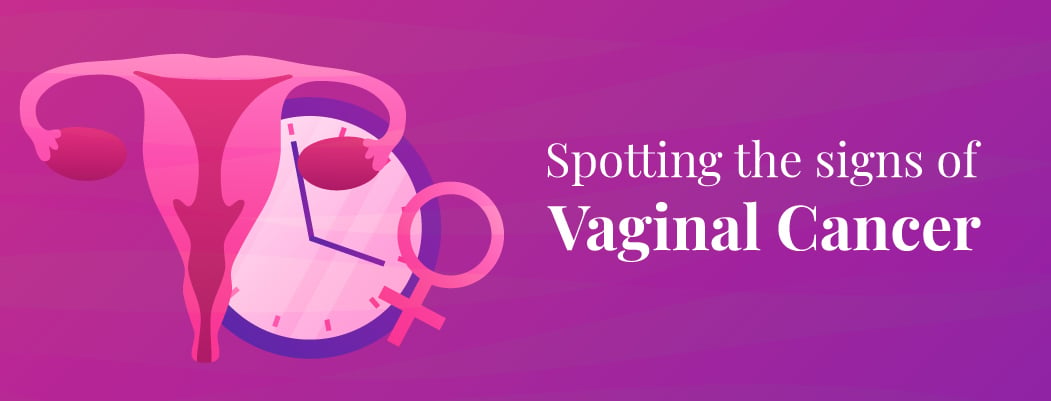Vaginal Cancer: Symptoms and Causes
December 24, 2022

The birth canal of a woman is her vagina, which connects her uterus’ opening to her external body. Although many different types of cancer can originate elsewhere and spread to the vagina, it is uncommon for cancer to start here. Instead, cancerous cells develop in your vagina, which causes vaginal cancer.
Contents
Types of Vaginal Cancer
The following are the main kinds of vaginal cancer:
- Squamous cell carcinoma: The majority of the time, this occurs. This type is sluggish to spread and tends to remain localized, while it has the potential to invade other organs, including your liver, lungs, or bones. Older women most frequently obtain this kind. Women 60 years of age and older make up about half of all new cases.
- Adenocarcinoma: This kind develops from glandular cells that line the inside of your vagina and produce fluids like mucus. It’s more likely to spread to other locations, such as your lungs and the lymph nodes in your groin (tiny organs that filter harmful substances from your body).
Even less commonly, pigment-producing cells, muscle, connective tissue, or sarcoma can all be affected by vaginal cancer (melanoma).
Causes and Risk Factors for Vaginal Cancer
There is no known cause for some cases of vaginal cancer. However, the majority are connected to HPV, or human papillomavirus, infection. Most of the time, an HPV infection resolves on its own, but if it persists, it can result in cervical and vaginal cancer.
Additionally, you may be at an increased risk for vaginal cancer if you:
- Are aged 60 or more.
- Drink alcohol.
- Have precancerous lesions or cervical cancer.
- Have HIV
- Smoke.
- Have vaginal intraepithelial neoplasia, which is uncommon in cells.
Symptoms of vaginal cancer
Symptoms of vaginal cancer are frequently absent. However, your doctor might discover it during a routine exam or Pap test.
If you experience symptoms, they might be:
- Your vagina is bleeding unusually
- Vaginal discharge that is watery or foul smelling.
- Pelvic pain
- Pain during sex
- Pain while urinating
- Peeing more frequently than normal
- Constipation
- A lump in the vagina
None of these indications necessarily indicate vaginal cancer. You might only be infected. However, it’s crucial to have it examined.
Also Read: An Introduction About Cancer And Its Treatment
Stages of Vaginal Cancer
After making the diagnosis, your doctor will perform imaging tests and other examinations to determine whether vaginal cancer has spread to other areas of your body. This aids them in determining cancer’s stage and course of treatment. They are as follows:
- Stage I: Only the vaginal wall of your body has cancer.
- Stage II: The tissue surrounding your vagina has been affected.
- Stage III: The pelvic wall has been affected by cancer.
- Stage IV (a): Your rectum, bladder lining, or another part of your pelvis has been affected by cancer.
- Stage IV(b): It has advanced to your bones or lungs, among other distant areas.
Diagnosis of vaginal cancer
Your doctor might perform a colposcopy to have a closer look if a pelvic exam or Pap test indicates there may be a problem. Your vagina and cervix will be examined with a colposcope and a lighted magnification tool. They might also remove some tissue so a professional can examine it under a microscope. It’s known as a biopsy.
Treatment for Vaginal Cancer
Treatment will depend on several factors, including the stage of cancer, its proximity to other organs if you’ve received pelvic radiation therapy, and whether you’ve undergone a hysterectomy to remove your uterus. Your doctor may suggest one or more of the following treatments:
Surgery: This is the most commonly used treatment. To remove tissue or growths, your doctor could employ a laser. Your vagina may be entirely or partially removed in various circumstances. Your cervix or other organs may require removal during a hysterectomy. After surgery, many women can resume their regular sexual lives. However, sex can increase your risk of infection, lead to bleeding, or stress the surgical site. Your doctor will advise you on what is and is not safe to do.
Radiation treatment: High-powered X-rays or other types of radiation are used to kill cancer. Your doctor may put a radioactive substance within your body, on or near the malignancy, or they may use a machine that delivers X-rays. The ovaries in your pelvis may be harmed by radiation therapy. They may stop producing oestrogen as a result, which can cause vaginal dryness and hot flashes, two signs of menopause. You won’t likely experience these issues if you’ve already gone through menopause. It can also irritate healthy tissue when used as therapy. Your vagina may become painful and swollen. Sex may cause discomfort.
Chemotherapy (“chemo” ): This uses medicine to eradicate or halt cancer cell growth. The medication may be ingested or administered intravenously (intravenous or IV). Your doctor may occasionally administer chemotherapy to you as a lotion or cream.
You can experience adverse effects like nausea, hair loss, and changes in body weight, or you might lose your libido. After treatment, these will get better or disappear.
Prevention of Vaginal Cancer
Your risk of vaginal cancer can be decreased by making several lifestyle changes:
- Delay having sexual relations until your late teens or later.
- Have sex with only one partner at a time.
- Don’t engage in sexual activity with multiple partners.
- When having sex, use condoms.
- Regularly have Pap tests.
- Stop smoking if you do.
Who to consult for vaginal cancer?
If you notice any symptoms or signs, schedule a consultation with your general physician or a gynaecologist first. If vaginal cancer is discovered, you’ll probably be directed to a doctor who specialises in cancers of the female reproductive system (gynecologic oncologist)
People also ask
1) What does vaginal cancer look like?
- Bleeding after sex that is not connected to menstruation.
- Bleeding after menopause in the vagina (when you no longer get periods).
- Discharge from the cervix that is bloody, bloody-smelling, or watery.
- Pain during sexual activity.
2) What are the four stages of vaginal cancer?
Stages of vaginal cancer range from I (1) through IV (4). The less the number, the less cancer has spread. Conversely, a higher number, such as stage IV, denotes that cancer has progressed more widely. Although every person’s experience with cancer is different, tumours at similar stages typically have a similar prognosis and are frequently treated similarly.
3) How do women get vaginal cancer?
What explicitly causes vaginal cancer is unknown. Yet, similar to cervical cancer, there is probably a connection between high-risk HPV strains and vaginal cancer. According to studies, many patients with vaginal cancer also tested positive for antibodies linked to the HPV strains linked to cervical cancer.








